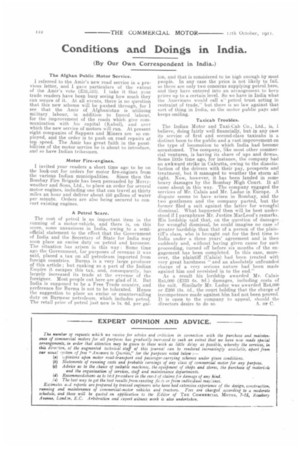Conditions and Doings in India.
Page 18

If you've noticed an error in this article please click here to report it so we can fix it.
(By Our Own Correspondent in India.)
The Afghan Public Motor Service.
.1 referred to the Amir's new road service in a previous letter, and I gave particulars of the extent of the Amir's vote (233,d33). I take it that your trade readers have been busy seeing how much they can secure of it. At all events, there is no question that this new scheme will be pushed through, for I see that the Amir of Afghanistan is utilising military labour, in addition to forced labour, for the improvement of the roads which give communication with his capital (Kabul), and over which the new service of motors will run. At present eight companies of Sappers and Miners are so employed, and the order is to push on road repairs at top speed. The Amir has great faith in the possibilities of the motor service he is about to introduce, and so have Indian tribesmen.
Motor Fire-engines.
I invited your readers a short time ago to be on the look-out for orders for motor fire-engines from the various Indian municipalities. Since then the Bombay Fire Brigade has been persuaded by Merryweather and Sons, Ltd., to place an order for several motor engines, including one that can travel at thirty miles an hour and deliver about 450 gallons of water per minute. Orders are also being secured to convert existing engines.
A Petrol Scare.
The cost of petrol is an important item in the running of a motor-vehicle, and there is, on this score, some uneasiness in India, owing to a semiofficial statement to the effect that the Government of India and the Secretary of State for India may soon place an excise duty on petrol and kerosene. The situation has arisen in this way : Some time ago the Government, for purposes of revenue it was said, placed a tax on all petroleum imported from foreign countries. Burma is a very large producer of this article ; but ranking as a part of the Indian Empire it escapes this tax, and, consequently, has largely increased its trade at the exnense of the foreigner. Most people out here are glad of it. But India is supposed to be a Free Trade country, and preference for -Burma is not to be tolerated. Hence the suggestion to place an excise or countervailing duty on Burmese petroleum, which includes petrol. The retail price of petrol just now is Is. 6d. per gal
Ion, and that is considered to be high enough by most people. In any case the price is not likely to fall, as there are only two concerns supplying petrothere, and they have entered into an arrangement to keep prices up to a certain level. So we have in India what. the Americans would call a" petrol trust acting in restraint of trade," but there is no law against that sort of thing in India, so the motor public pays and keeps smiling.
Taxicab troubles.
The Indian Motor and Taxi-Cab Co., Ltd., is, I believe, doing fairly well financially, but in any case its service of first and second-class taxicabs is a distinct boon to the public and a vast improvement on the type of locomotion to which India had become accustomed. The company, like most other commercial ventures is having its share of ups and downs. Some little time ago, for instance, the company had an awkward strike in Calcutta, owing to the dissatisfaction of the drivers with their pay, prospects and treatment, lout it managed to weather the storm all right. Now, however, it has been landed in some heavy damages by the Bombay High Court. It all came about in this way. The company engaged the services of Mr. Calais and Mr. Laduc in Europe. A dispute seems to have arisen in Bombay, and the two gentlemen and the company parted, but the former filed a suit against the latter for wrongful dismissal. What happened then will be best understood if I paraphrase Mr. Justice MacLeod's remarks. His lordship said that, on the question of damages for wrongful dismissal, he could imagine no case of greater hardship than that of a person of theplaintiff's class, who is brought out for the first time to India under a three years' agreement and is then suddenly and, without having given cause for such proceeding, turned off before six months of the engagement has been completed. In this ease, moreover, the plaintiff (Calais) had been treated with very great harshness "and an absolutely unfounded charge of a very serious nature had been made against him and persisted in to the end." As a result his lordship awarded Mr. Calais Rs5,000 (R333 6s. 8d.) damages, including costs of the suit. Similarly Mr. Laduc was awarded Rs4,000 or 2266 Ins. 4d., the court holding that the charge of incompetence made against him had not been proved. It is open to the company to appeal, should the directors desire to do so. A. OF C.
























